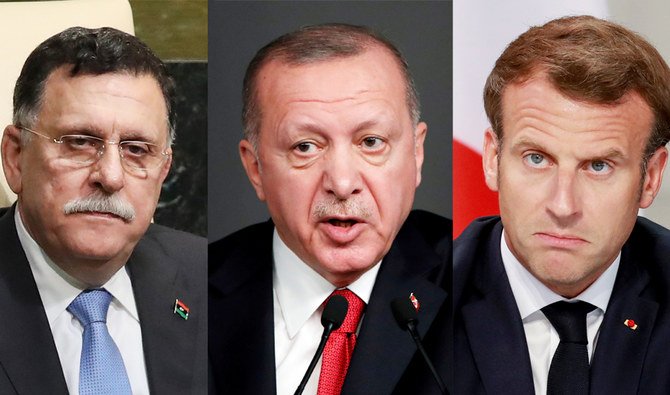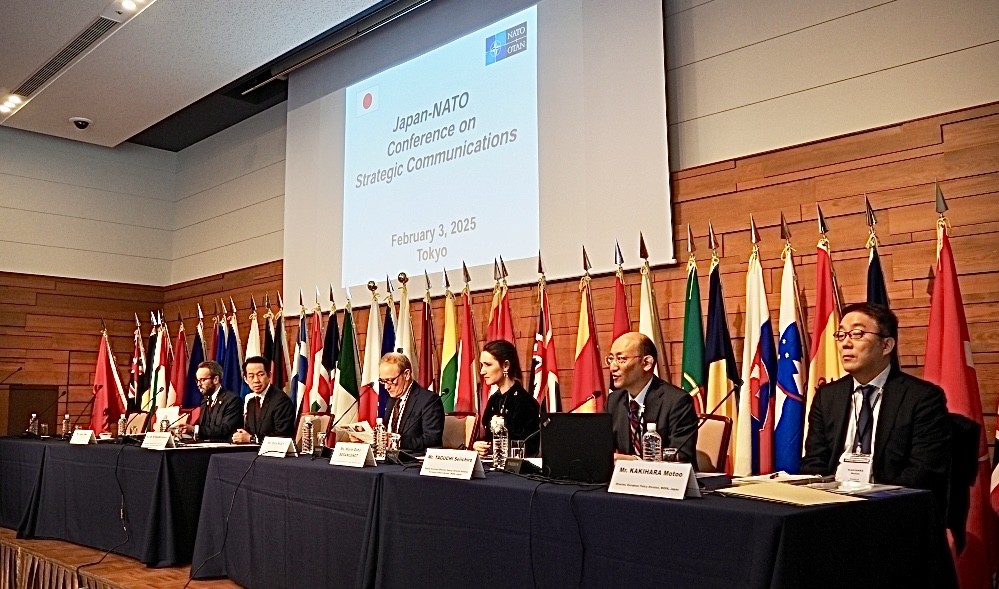ANKARA: Current tensions between Paris and Ankara — especially over Libya, Syria and the east Mediterranean — risk turning into longtime rivalry, experts say.
The conflict began escalating last November when Turkish President Recep Tayyip Erdogan advised his French counterpart Emmanuel Macron to “check whether he is brain dead” after the two leaders traded criticism over Ankara’s cross-border offensive in northeast Syria.
Turkey recently blamed France for “dragging Libya into chaos,” just a day after Macron accused Ankara of being involved in a “dangerous game” in Libya and urged Erdogan to end his activities in the war-torn country.
Turkey backs the Government of National Accord (GNA) in Tripoli and has accused France of favoring GNA’s rival eastern commander Khalifa Haftar, although Paris denies this.
Tensions between the two NATO allies recently escalated after a standoff between Turkish warships and a French naval vessel in the Mediterranean on June 10. France criticized the alleged nuisance to a French ship by Turkish frigates in terms of NATO’s rules of engagement.
Although Ankara denied the accusation, NATO is conducting an investigation into the incident.
Turkey detained four of its nationals on June 22 on suspicion of spying for France through conservative and religious groups.
With all the political and military cards on the table, the crucial question is whether such heated exchanges may escalate to the point of rivalry and change the already fragile balance.
“A supposed competition between France and Turkey in Libya and the Mediterranean is only one angle to a wider geopolitical trend comprising both Russia and Turkey, in more or less coordinated ways,” Marc Pierini, a visiting scholar at Carnegie Europe, told Arab News.
Pierini, a former EU ambassador to Turkey, made a comparison between Russia’s challenge to the Western bloc and Turkey’s recent moves.
“Russia has long started to challenge NATO and the EU with the annexation of Crimea. It pursued its military and political interests by installing or enlarging bases in Syria. In a consistent fashion, Moscow is now extending its military footprint to Libya,” he said. “Turkey is following a similar pattern; following its four distinct military operations in northern Syria it has now unilaterally changed the eastern Mediterranean maritime boundaries with the consent of Libya’s GNA against military support.”
In addition to Ankara’s controversial purchase of the Russian S-400 missile defense system, Pierini thinks that Russia and Turkey have created a new geopolitical reality on the southern flank of Europe.
“For the EU, the UK, the US and NATO, this is a new challenge,” he said.
France, which accuses Ankara of blocking truce efforts in Libya and breaking the UN arms embargo, also recently urged talks among NATO allies about Turkey’s “aggressive” role in Libya.
For Emre Kursat Kaya, a security analyst with the Istanbul-based Center for Economics and Foreign Policy Studies (EDAM), if actors such as Germany or Italy do not manage to bridge the gap, the current situation may turn into a geopolitical rivalry.
“There is a clear need for an arbitrator. The situation is more complicated than simply ideological differences. It is about conflicting interests in the Mediterranean and even sub-Saharan Africa,” Kaya told Arab News.
He thinks that such a rivalry might have structural impacts on NATO.
“The current French government has an agenda to build a stronger European defense initiative. It advances Turkey’s actions as examples of why such an alternative is necessary. In recent events, Paris has opted to side with Ankara’s regional adversaries such as the Syrian Kurdish YPG, Egypt and United Arab Emirates,” Kaya said.
“The Turkish government might use such behavior from one of its allies to legitimize its non-NATO partnerships at home and abroad,” he said.
Ozgur Unluhisarcikli, Ankara office director of the German Marshall Fund of the United States, thinks that the clashing interests of Turkey and France have created a simmering geopolitical competition between the two countries, especially in Libya.
“Both countries are acting based on their perceived national interest although they put forward other arguments. Unless a modus vivendi between Turkey and France is reached, this competition could evolve into rivalry inevitably reflecting on EU-Turkey relations, making even transactional cooperation between the two very difficult,” he told Arab News.
According to Unluhisarcikli, to avoid such a situation the two countries need to implement measures facilitated by a trusted third party.
“One confidence-building measure could be Turkey recognizing France as a negotiating party rather than dealing only with Russia. Germany, a NATO ally that also currently holds the rotating presidency of the EU, has already taken the initiative for a ceasefire in Libya and is therefore well-positioned to facilitate such a process,” he said






















